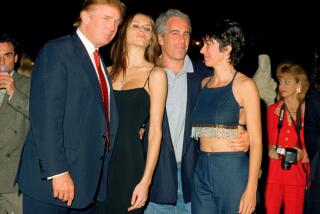J. David Bookkeeper Saw Hoover as No. 2
- Share via
A former bookkeeper for J. David & Co. testified Tuesday that she considered Nancy Hoover Hunter to be the second in command at the La Jolla investment firm and that Hunter met behind closed doors virtually every day with J. David (Jerry) Dominelli, the firm’s founder and head.
The bookkeeper, Gioia Paulk, began working for the firm in January, 1982, two years before nervous investors forced it into bankruptcy and learned of the huge Ponzi scheme, in which money from new investors was used to pay off old ones and little or no trading was done.
Dominelli is serving a 20-year prison sentence for his part in the $180-million fraud, and Hunter, his former girlfriend, is on trial, charged with 234 counts of fraud, conspiracy, income-tax evasion and making false statements to a federal agent.
Paulk testified Tuesday that, during her time with the firm, she believed Dominelli was conducting a legitimate business and that Hunter was in love with him.
“I would say that Jerry would be No. 1 and Nancy would be No. 2,” Paulk responded when Assistant U. S. Atty. Stephen P. Clark asked her to describe the firm’s management structure.
Hunter’s attorneys are attempting to convince the federal jury that Dominelli alone was responsible for the fraud and that Hunter was unaware of the illegal activity.
Paulk also testified Tuesday that she was never given access to brokerage-house statements, the raw data that was the basis for the customer account statements she prepared and mailed out each month. Instead, she used figures given to her by Dominelli and two other employees of J. David, but not Hunter, she said.
Prosecutors have charged that J. David lured investors to its commodity pool accounts with promises of 30% to 40% annual profits.
Testifying as an expert witness Tuesday, Warren Nelson, former president of Clayton Brokerage Co., said such profits are unusual for commodity speculators.
Prosecutors are attempting to show that Hunter, a licensed broker, was knowledgeable enough about commodity trading that she would have realized that such profits were unlikely.
More to Read
Inside the business of entertainment
The Wide Shot brings you news, analysis and insights on everything from streaming wars to production — and what it all means for the future.
You may occasionally receive promotional content from the Los Angeles Times.










